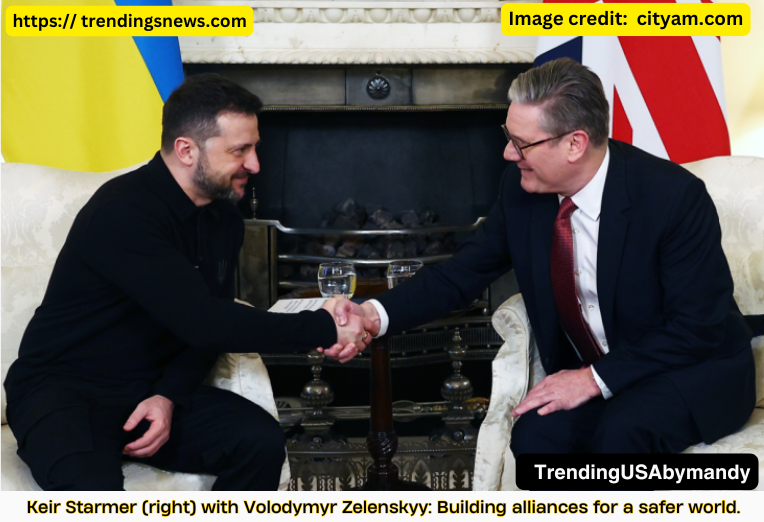Labour Surpasses Tories in Defence Trust, according to a new poll. Explore the implications of this shift, the debate over defence spending, and its impact on UK politics and global alliances.
Introduction: A Historic Shift in Public Trust
In a historic and unexpected turn of events, the Labour Party has overtaken the Conservatives as the most trusted party to manage the UK’s defence and national security.
According to the latest City AM Freshwater Strategy poll, 27% of respondents now trust Labour over the Conservatives’ 26%.
This marks a significant shift in public opinion, especially as the government plans to increase defence spending by reallocating funds from the international development budget.
This article delves into the details of this shocking shift, its implications for UK politics, and the broader global context.
The Poll Results: Labour Takes the Lead
Labour Surpasses Tories in Defence Trust
The City AM Freshwater Strategy poll reveals a dramatic shift in public trust. For the first time in years, Labour has surpassed the Conservatives on defence and national security, with 27% of respondents favoring Sir Keir Starmer’s party.
This is a remarkable development, considering the Conservatives have long been perceived as the stronger party on defence issues.
Public Support for Increased Defence Spending
A significant majority of UK voters (58%) support increasing defence spending to 3% of GDP. This reflects a growing concern about national security amid rising global tensions.
Interestingly, 60% of respondents also back the government’s plan to fund this increase by cutting the international aid budget. This indicates a clear prioritization of national security over foreign aid in the current geopolitical climate.
Starmer’s Leadership Edge
Sir Keir Starmer has further solidified his position as the preferred Prime Minister, with 36% backing him compared to Kemi Badenoch’s 34%.
This marks an eight-point increase since January, showcasing Starmer’s growing appeal among voters. However, it’s worth noting that both leaders maintain net negative approval ratings, with Starmer at -34 and Badenoch at -9.
The Implications: A New Era for UK Defence Policy
Labour Surpasses Tories in Defence Trust: What It Means for the UK
Labour’s rise in trust on defence issues suggests a shift in public perception. The party has emphasized a robust defence strategy, including a “coalition of the willing” to support Ukraine and a commitment to increasing defence spending.
This approach resonates with voters who are increasingly concerned about global instability.
Conservative Challenges
Despite their traditional strength on defence, the Conservatives are facing challenges. The party’s approval rating on defence saw a 13-point increase since last month, but it wasn’t enough to maintain their lead.
This could signal a need for the Tories to rethink their approach to national security and reconnect with voters.
Global Implications of Labour Surpassing Tories in Defence Trust
The UK’s defence policies have far-reaching implications, especially in the context of the ongoing conflict in Ukraine.
Labour’s call for a stronger European coalition to defend peace in Ukraine aligns with broader global security concerns. This shift in UK policy could influence international alliances and the balance of power in Europe.
The Funding Debate: Defence vs. International Aid
Public Backing for Funding Shifts
The poll shows strong public support for increasing defence spending, even if it means cutting the international aid budget. This reflects a prioritization of national security over foreign aid in the current geopolitical climate.
The government’s plan to raise defence spending to 2.5% of GDP by 2027, funded by reductions in overseas aid, has garnered significant approval.
Critics’ Concerns
While the majority supports the funding shift, critics argue that reducing international aid could harm the UK’s global reputation and its ability to address humanitarian crises.
Balancing these priorities will be a key challenge for the government. Critics also warn that cutting aid could undermine long-term global stability, which is closely linked to national security.
The Broader Context: UK Politics and Global Alliances
Labour Surpasses Tories in Defence Trust: A Turning Point in UK Politics
The latest poll results mark a turning point in UK politics, as Labour Surpasses Tories in Defence Trust. This shift could have significant implications for the upcoming elections and the future of UK defence policy.
It also reflects changing voter priorities in a world increasingly defined by geopolitical tensions, highlighting why Labour Surpasses Tories in Defence Trust is a critical development in British politics.
The Role of Leadership
Sir Keir Starmer’s leadership has been instrumental in Labour’s rise. His emphasis on a strong defence policy and his ability to connect with voters on national security issues have contributed to the party’s growing popularity.
In contrast, the Conservatives’ inability to maintain their lead on defence highlights the challenges they face under Kemi Badenoch’s leadership.
The Global Stage
The UK’s defence policies are closely watched on the global stage. Labour’s call for a “coalition of the willing” to support Ukraine and its commitment to increased defence spending could strengthen the UK’s position in international alliances.
However, the decision to cut international aid may strain relationships with developing nations and humanitarian organizations.
Connecting the Dots: Trump Halts Military Aid to Ukraine
As the UK grapples with its defence priorities, a similar debate is unfolding across the Atlantic. President Trump’s decision to halt military aid to Ukraine has raised questions about the future of US-Ukraine relations.
Both developments highlight the complex interplay between national security, international alliances, and public opinion in shaping global politics.
The UK’s shift in defence trust and the US’s pause on military aid underscore the challenges of navigating an increasingly unstable world.

